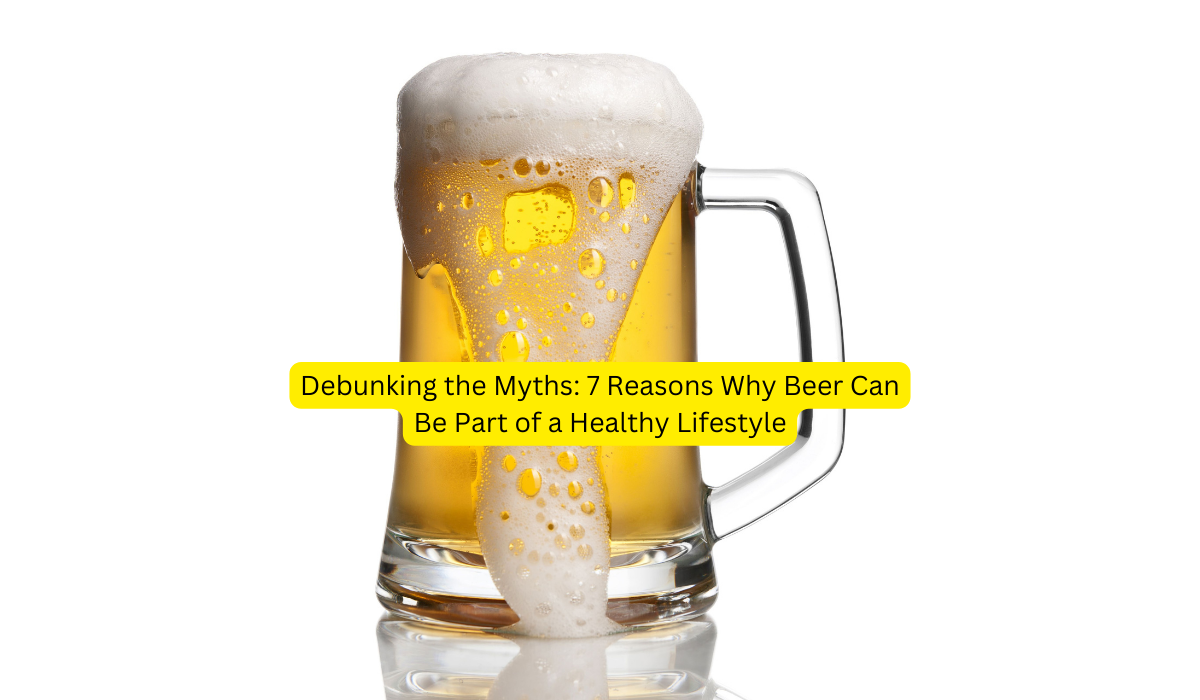For centuries, beer has been a social lubricant, a refreshing beverage, and even a culinary ingredient. But in recent years, it’s often demonized as unhealthy. The truth, like most things in life, is more nuanced. While excessive beer consumption undoubtedly has negative consequences, enjoyed in moderation, beer can offer surprising health benefits. Let’s raise a glass (responsibly, of course) to exploring seven reasons why beer isn’t the villain it’s sometimes made out to be.
1. A Treasure Trove of Essential Nutrients
Think of beer as a liquid multivitamin – not the sugary kind, of course. Beer, particularly darker varieties, boasts a surprising array of essential nutrients. It’s a good source of B vitamins, crucial for energy production and cell metabolism. Imagine your body as a well-oiled machine – B vitamins keep it running smoothly. Beer also packs a punch of minerals like magnesium, which helps regulate blood sugar and muscle function, and silicon, which may contribute to bone health. It’s not a magic potion for strong bones, but think of it as a supporting cast member.
2. The Heart-Healthy Hero You Didn’t Know About
Here’s a surprising fact: moderate beer consumption might actually benefit your heart. Studies suggest that the moderate intake of beer, thanks to its presence of antioxidants and anti-inflammatory properties, may reduce the risk of heart disease. Imagine your arteries as smooth highways for blood flow. Antioxidants in beer can help keep those highways clear and reduce inflammation, potentially leading to a healthier heart. Remember, moderation is key. Think of it like enjoying a scenic route on your highway – too much traffic (excessive beer) can slow you down.
3. Cheers to a Stronger You: Bone Benefits of Beer
We all know calcium is important for strong bones, but did you know silicon might play a supporting role too? Beer, particularly lighter varieties, contains a decent amount of silicon, a mineral linked to improved bone mineral density. Think of your bones as a strong building – calcium is the foundation, and silicon might be like the reinforcing rods that add extra strength. While beer shouldn’t replace other sources of calcium and bone-supporting nutrients, it can contribute to a well-rounded approach to bone health.
4. A Gut Feeling: Beer and Digestive Health
Here’s a toast to a happy gut! The fermentation process in beer can produce probiotics, those friendly bacteria that contribute to a healthy digestive system. Imagine your gut as a complex ecosystem – probiotics help maintain a healthy balance of good and bad bacteria, promoting overall digestive well-being. While beer isn’t a magic bullet for gut health, it can be a tasty way to support a balanced digestive microbiome.
5. Beyond the Buzz: Beer and Cognitive Function
While excessive alcohol consumption can impair cognitive function, some studies suggest that moderate beer intake might have the opposite effect. Research indicates that a moderate beer habit might be linked to a reduced risk of cognitive decline and improved cognitive function in older adults. Think of your brain as a computer – moderate beer consumption, according to some studies, might help keep it running smoothly as you age. Remember, more research is needed in this area, and consulting with a doctor is always recommended.
6. Social Lubricant and Stress Reliever: The Mental Benefits of Beer
Beer isn’t just about physical health – it can contribute to mental well-being too. Sharing a beer with friends can be a great way to unwind, socialize, and de-stress. Imagine the weight of daily life as a heavy backpack – enjoying a beer with friends can feel like taking that backpack off for a while. Of course, moderation is key – overdoing it can have the opposite effect. But enjoyed responsibly, beer can be a way to connect, relax, and relieve some of life’s pressures.
7. Beer – A Source of Hydration (…Sort Of)
Okay, this one requires a bit of explanation. Beer is a diuretic, meaning it increases urination. So, technically, it doesn’t directly hydrate you like water. However, some studies suggest that moderate beer consumption, particularly non-alcoholic beers, can still contribute to overall hydration, especially if you’re enjoying it alongside water or other hydrating beverages. Think of it like this: while beer might make you visit the restroom more often, it doesn’t necessarily mean you’re dehydrated – just be sure to stay hydrated with water as well.
Conclusion: Beer – Enjoy Responsibly, Reap the Benefits
Let’s be clear: beer isn’t a health food, and excessive consumption can have negative consequences. However, enjoyed responsibly, beer can be a part of a healthy lifestyle. It offers essential nutrients, may contribute to heart and bone health, and can even promote relaxation and social connection.
FAQs: Debunking the Myths of Beer and Health
Here are five unique FAQs to quench your curiosity about beer and its potential health benefits:
1. Isn’t beer just empty calories?
While beer does contain calories, it’s not entirely devoid of nutrients. It offers B vitamins, minerals like magnesium and silicon, and even some antioxidants. However, moderation is key. Lighter beers tend to have fewer calories, but always be mindful of portion sizes.
2. Can beer help me lose weight?
No, beer isn’t a weight-loss miracle drink. The calories in beer can add up quickly, and alcohol can interfere with your body’s ability to burn fat. If weight loss is your goal, focus on a balanced diet and exercise routine.
3. I have health concerns. Is beer still okay for me?
Always consult your doctor before consuming alcohol, especially if you have any underlying health conditions. Medications can interact with alcohol, and some health issues might make beer consumption inadvisable.
4. How much beer is considered “moderate”?
The official definition of moderate drinking varies depending on factors like sex and weight. Generally, for healthy adults, moderation means one drink per day for women and two drinks per day for men. Remember, these are just guidelines – always prioritize your individual health and consult your doctor if unsure.
5. What are some non-alcoholic alternatives to enjoy the benefits of beer?
If you’re looking for the taste and social aspects of beer without the alcohol, there are plenty of great non-alcoholic options available. Many breweries offer flavorful non-alcoholic beers, and some even contain probiotics for gut health benefits.

